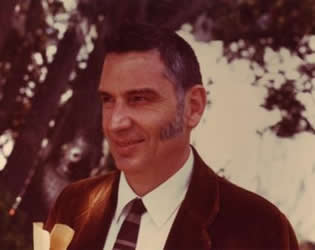

|

|
IN MEMORIAM
Robert Lawson Vaught
Professor of Mathematics, Emeritus
UC Berkeley
1926 – 2002
Robert Lawson Vaught, one of the great pioneers in the branch of logic known as model theory, which applies the ideas of traditional logic to the study of algebraic and other mathematical structures, died on April 2, 2002 after an extended illness.
Born in Alhambra, California, on April 4, 1926, Vaught displayed as a child a great talent in music and seemed headed toward a possible career as a pianist. His university studies, which he began at age 16 at Pomona College, were interrupted by World War II. He entered the Navy and was placed in the V12 program at the University of California, Berkeley, where he obtained an A.B. in Physics in 1945. He completed naval service in 1946 with the rank of Lieutenant j.g. and returned to Berkeley for graduate studies in mathematics.
As a graduate student, Vaught made (with Professor John Kelley) an important contribution toward the solution of a major problem in the theory of C* algebras. When Kelley was forced to leave Berkeley during the Loyalty Oath Controversy, Vaught came under the influence of the great logician Alfred Tarski and wrote his doctoral dissertation under him, obtaining a Ph.D. in Mathematics in 1954. Tarski was the principal founder of the theory of models; and Vaught, as a student and in later work, accelerated its development by proving a number of basic principles of the theory and formulating several of its most fundamental and important concepts.
After obtaining his doctorate in 1954, Vaught joined the faculty of the University of Washington in Seattle, serving there as an Instructor and Assistant Professor until 1958, when he accepted a call to return to Berkeley, where Tarski was building a group that would soon bring Berkeley wide recognition as the world's leading center for research in mathematical logic. Vaught became a central member of the group, attaining the rank of Professor in 1963 and teaching there until his retirement in 1991. His achievements were recognized by a Fulbright Scholarship (Amsterdam, 1956-57), a National Science Foundation Senior Postdoctoral Fellowship (University of California, Los Angeles, 1963-64), and a Guggenheim Fellowship (Zurich, 1967).
Many of the fundamental concepts and results in model theory are due to Vaught. In 1957 he introduced, with Tarski, the notion of elementary submodel, and in 1962, with Michael Morley, the concept of a saturated structure. He will be remembered for the Tarski-Vaught criterion for one structure to be an elementary extension of another; the Feferman-Vaught product theorem; the Los-Vaught test for completeness and decidability; the Vaught two-cardinal theorem; the celebrated Vaught conjecture on the number of models of countable complete theories (long one of the most famous unsettled statements in logic and one that has stimulated a vast amount of important research); and his paper "Invariant sets in topology and logic," which he regarded as his best work. This paper introduced the Vaught transform, and for it in 1978, Vaught was awarded the first Carol Karp Prize of the Association of Symbolic Logic, the leading international award for research in mathematical logic and one that is given only every five years.
In addition to his work in model theory, Vaught also made important contributions to other branches of logic, including set theory, proof theory, and recursive function theory; and his influence extended into computer science. The leading theoretical computer scientist Ronald Fagin of IBM has noted that his own most famous result (Fagin's theorem on the class of problems decidable by nondeterministic Turing machines in polynomial time) resulted from a line of research suggested by his dissertation supervisor Vaught.
Vaught's writing was noted for its great clarity and economy. In 1985 he published a senior-level undergraduate text on set theory that was described by a reviewer as "impeccable in its precision, thoughtful in its historical and methodological commentary".
He had a long line of distinguished students who wrote their doctoral dissertations under his guidance. In letters written after his death they described the debt they owed him for the high standards he insisted on in writing and in discourse, and the kindness he showed them during the sometimes painful process of reaching their goals. His dissertation supervisee Douglas Miller commented as follows: "From my first encounter with him when I was a participant in his logic seminar during my second year at Berkeley, I found that his style of interaction was entirely collegial with no hint of condescension or aloofness. That collegial style included a kind of fierceness when he was misunderstood or when he could not make complete sense of what he was being told. Some students found this off-putting but having realized rather quickly that the ferocity was directed at the subject under discussion and not at the individual with whom he was conversing, I found it a reassuring sign of his engagement in a joint battle against the forces of confusion. I've never known anyone else who could be so genuinely angry at an untidy argument."
The prominent logician Michael Morley of Cornell University, whose doctoral dissertation was supervised by Vaught, wrote: "His help and kindness made a vast difference in my life. I knew then, and now, that I would never fully repay him. For the subsequent forty years, whenever I helped a student I thought to myself: this is a payment on the debt I owe Robert Vaught."
Besides being a lifelong lover of music, Vaught was an accomplished tennis player and an avid outdoorsman and mountain hiker. A frequent traveler to Hawaii and a lover of ocean swimming, he also devoted some of his time in retirement to the hobby of investing. While living in Seattle, Vaught met, and in 1955 married, Marilyn Maca. They had two children, Katherine and David, who along with Marilyn and Vaught's granddaughter, Diana, and sister, Gail Searcy, survive him.
John Addison
William Bade
William Craig
Leo Harrington